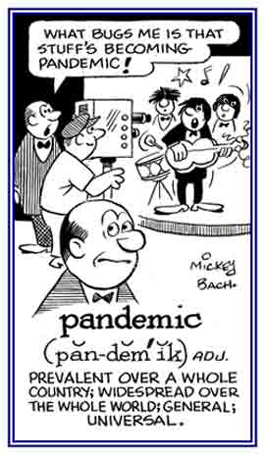demo-, dem-, demio-, -demic, -deme, -demically
(Greek: people, population)
From Greek: district, country, land, and the people who inhabit those areas or territories.
1. The occurrence of highly adapted plants or animals in a particular geographic area.
2. The ecological state of being unique to a particular geographic location; such as, a specific island, habitat type, nation, or other defined zone.
2. The ecological state of being unique to a particular geographic location; such as, a specific island, habitat type, nation, or other defined zone.
To be endemic to a place or geographic area means that it is found only in that part of the world and nowhere else.
endemoepidemic (adjective), more endemoepidemic, most endemoepidemic
A reference to a disease that is endemic but capable of becoming epidemic from time to time.
epidemic (ep" i DEM ik) (adjective), more epidemic, most epidemic
1. Widespread, over or among many people at the same time; such as, a disease.
2. A special reference to a human contagious disease.
3. The rapid widespread occurrence of a fad, fashion, etc.
4. Etymology: from Greek epidemia, "disease prevalent among the people"; formed from the prefix epi-, "among" + demos, "people".
2. A special reference to a human contagious disease.
3. The rapid widespread occurrence of a fad, fashion, etc.
4. Etymology: from Greek epidemia, "disease prevalent among the people"; formed from the prefix epi-, "among" + demos, "people".
epidemic hysteria, mass hysteria
Hysteria in a group of people, usually closely associated in a school or workplace.
The inciting incident might be a rumor or an unaccustomed odor; such as, paint fumes in a workplace.
An acute infectious disease usually occurring in epidemic form, characterized by paroxysms (fit or violent attack) of pain, usually in the chest: An epidemic pleurodynia is a very infectious disease that progresses and spreads swiftly from person to person.
Epidemic pleurodynia is characterized by very serious and critical chest pain in the lower thorax and upper abdomen area and omcöides fever.
epidemical (adjective), more epidemical, most epidemical
1. Descriptive of an outbreak of a disease that spreads more quickly and more extensively among a group of people than would normally be expected.
2. A reference to the spreading of a disease that attacks many people at about the same time and may spread through one or several communities.
2. A reference to the spreading of a disease that attacks many people at about the same time and may spread through one or several communities.
The quality of being epidemic.
1. A descriptive treatise of epidemic diseases or of any particular epidemic.
2. A treatise upon, or history of, epidemic diseases.
2. A treatise upon, or history of, epidemic diseases.
A specialist in the medical study of causes and transmissions of diseases among people.
1. The scientific and medical study of the causes and transmission of disease within a population: Epidemiology is the study and analysis of the patterns, causes, and effects of health and disease conditions in certain populations.
2. The origin and development characteristics of a particular disease.
2. The origin and development characteristics of a particular disease.
Of or belonging to all of the people, public, general: A pandemia results in a global epidemic because of modern transportation methods which can eventually cause a universal state of emergency.
pandemic (adjective), more pandemic, most pandemic
1. Pertaining to something that is prevalent over the whole of a country or continent, or over the whole world; distinguished from epidemic, which may imply or indicate limitations to a smaller area: Most people on earth have a pandemic horror of a war breaking out and destroying their lives.
2. Relating to illnesses that affect the majority of a population in a large region; such as, a disease that is widespread at the same time in many parts of the world: AIDS is currently considered to be a pandemic problem, but this term has also traditionally included such disorders as cholera, plague, and influenza. 3. Etymology: from 1666 which came from Greek pandemos, "pertaining to all people"; from pan-, "all" + demos, "people".

© ALL rights are reserved.
Go to this Word A Day Revisited Index
2. Relating to illnesses that affect the majority of a population in a large region; such as, a disease that is widespread at the same time in many parts of the world: AIDS is currently considered to be a pandemic problem, but this term has also traditionally included such disorders as cholera, plague, and influenza. 3. Etymology: from 1666 which came from Greek pandemos, "pertaining to all people"; from pan-, "all" + demos, "people".

Go to this Word A Day Revisited Index
so you can see more of Mickey Bach's cartoons.
A country or a government that masquerades or claims, or has claimed, to be a democracy but where power actually is controlled by those who are rich: Many of the governments that have emerged from former colonial states claimed to be democracies but they were really plutodemocracies.
plutodemocratic (adjective) (not comparable)
A term that describes a country or state which claims to be a democracy but where the real power lies with those who are wealthy: The plutodemocratic government was nervous because it was facing open elections, allowing not only the affluent to vote or to be elected, but also those who were from the average economic group.
pseudoepidemic (adjectivd), more pseudoepidemic, most pseudoepidemic


